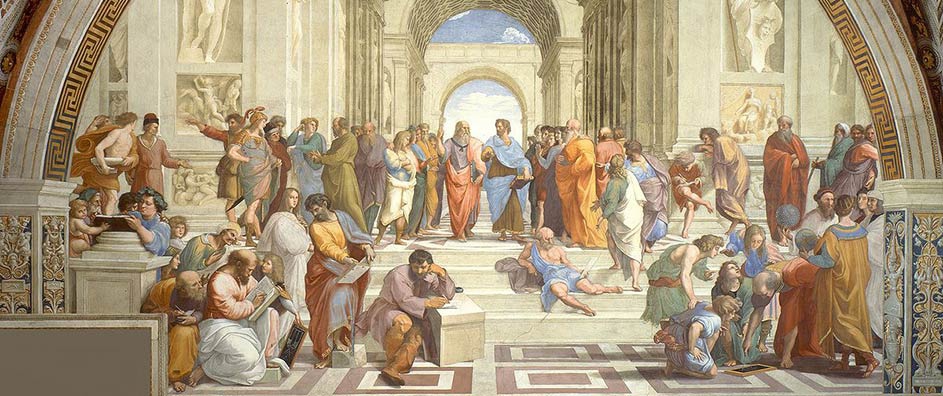The views expressed in our content reflect individual perspectives and do not represent the authoritative views of the Baha'i Faith.
The deepest insights of philosophy, the Baha’i teachings say, have emanated from the prophets and messengers who founded the world’s Faiths.
The sages of the past, who we revere for their wisdom and insight, and who we’ve based the fundamental foundations of our culture on, adapted concepts and ideas they learned from the school of the prophets. Baha’is believe that religion often provides the original source material for philosophy, for science, for ethics and for the world’s progress:
Although it is recognized that the contemporary men of learning are highly qualified in philosophy, arts and crafts, yet were anyone to observe with a discriminating eye he would readily comprehend that most of this knowledge hath been acquired from the sages of the past, for it is they who have laid the foundation of philosophy, reared its structure and reinforced its pillars. Thus doth thy Lord, the Ancient of Days, inform thee. The sages aforetime acquired their knowledge from the Prophets, inasmuch as the latter were the Exponents of divine philosophy and the Revealers of heavenly mysteries. Men quaffed the crystal, living waters of Their utterance, while others satisfied themselves with the dregs. Everyone receiveth a portion according to his measure. Verily He is the Equitable, the Wise. – Baha’u’llah, Tablets of Baha’u’llah, pp. 144.
In this fascinating passage from the Baha’i writings, Baha’u’llah details the history of the ideas of Empedocles and Pythagoras, the pre-Socratic Greek philosophers who both developed philosophies that focused on mysticism and the spiritual growth of the individual soul:
Empedocles, who distinguished himself in philosophy, was a contemporary of David, while Pythagoras lived in the days of Solomon, son of David, and acquired Wisdom from the treasury of prophethood. It is he who claimed to have heard the whispering sound of the heavens and to have attained the station of the angels. In truth thy Lord will clearly set forth all things, if He pleaseth. Verily, He is the Wise, the All-Pervading. – Ibid., pp. 144-145.
Pythagoras and Empedocles drew from and contributed to the spiritual understandings of their time, and were heavily influenced by the wisdom tradition of King David and his son Solomon, both minor prophets in the Bible. In turn, the philosophies of Pythagoras and Empedocles were adopted by the Hellenized Jews of the city-state of Alexandria in Egypt, who of course followed the teachings of the prophets Abraham and Moses—and who later became some of the very first Christians. Those philosophies influenced the entire world.
The Baha’i teachings reinforce this conception of history—that the philosophers we revere in Western culture received the core of their wisdom from the prophets, sages and spiritual teachers of the East:
The essence and the fundamentals of philosophy have emanated from the Prophets. That the people differ concerning the inner meanings and mysteries thereof is to be attributed to the divergence of their views and minds. – Ibid., p. 146.
This fits the Baha’i principle that history and human progress move forward as a result of the motive power of a series of successive revelations. In the same vein, Aristotle said that God is the prime mover of the universe and thereby the ultimate animator of everything within it. In more modern times, the great philosopher Hegel became the foremost modern exponent of the idea that the progress of humanity consists in the working out and consummation of the Creator’s will. Hegel wrote: “Spirit, or Mind, is the only motive principle of history.”
The Baha’i teachings agree, saying that the Holy Spirit—the animating force of God’s will in the world—provides the true engine for the progress of humanity:
… understand that the Holy Spirit is the energizing factor in the life of man. Whosoever receives this power is able to influence all with whom he comes into contact. – Abdu’l-Baha, Paris Talks, p. 165.
“Progress” is the expression of spirit in the world of matter. The intelligence of man, his reasoning powers, his knowledge, his scientific achievements, all these being manifestations of the spirit, partake of the inevitable law of spiritual progress and are, therefore, of necessity, immortal.
My hope for you is that you will progress in the world of spirit, as well as in the world of matter; that your intelligence will develop, your knowledge will augment, and your understanding be widened. – Ibid., p. 90.
Essentially, then, Baha’is see the sequence of the prophets and founders of the world’s major religions as the first educators of humanity:
Jesus Christ was an Educator of humanity. His teachings were altruistic; His bestowal, universal. He taught mankind by the power of the Holy Spirit and not through human agency, for the human power is limited, whereas the divine power is illimitable and infinite. The influence and accomplishment of Christ will attest this. Galen, the Greek physician and philosopher who lived in the second century A.D., wrote a treatise upon the civilization of nations. He was not a Christian, but he bore testimony that religious beliefs exercise an extraordinary effect upon the problems of civilization. In substance he said, “There are certain people among us, followers of Jesus, the Nazarene, who was killed in Jerusalem. These people are truly imbued with moral principles which are the envy of philosophers. They believe in God and fear Him. They have hopes in His favors; therefore, they shun all unworthy deeds and actions and incline to praiseworthy ethics and morals. Day and night they strive that their deeds may be commendable and that they may contribute to the welfare of humanity; therefore, each one of them is virtually a philosopher, for these people have attained unto that which is the essence and purport of philosophy. These people have praiseworthy morals, even though they may be illiterate.”
The purpose of this is to show that the holy Manifestations of God, the divine Prophets, are the first Teachers of the human race. They are universal Educators, and the fundamental principles they have laid down are the causes and factors of the advancement of nations. – Abdu’l-Baha, The Promulgation of Universal Peace, pp. 85-86.
















Comments
Sign in or create an account
Continue with Googleor